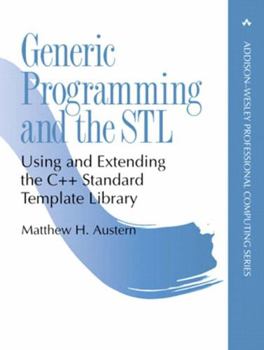Generic Programming and the STL: Using and Extending the C++ Standard Template Library
Select Format
Select Condition 
Book Overview
Dieses historische Buch kann zahlreiche Tippfehler und fehlende Textpassagen aufweisen. Kaufer konnen in der Regel eine kostenlose eingescannte Kopie des originalen Buches vom Verleger herunterladen... This description may be from another edition of this product.
Format:Paperback
Language:English
ISBN:0201309564
ISBN13:9780201309560
Release Date:October 1999
Publisher:Addison-Wesley Professional
Length:576 Pages
Weight:2.30 lbs.
Dimensions:1.2" x 7.5" x 9.6"
Customer Reviews
5 ratings
Explains why, not just tells what
Published by Thriftbooks.com User , 17 years ago
This book has depth. It tells you why, at least in some cases. For example, the Musser and Saini book (2nd ed) describes class template iterater_traits, but doesn't tell you why it was designed and structured that way. This book, however, provides very good explanation on it in chapter 3.
The best source of information on the STL
Published by Thriftbooks.com User , 23 years ago
If you know something about the STL, but need to know exactly how it is specified, and what will work portably across systems, this book is both readable and authoritative. Best buy two copies if you have colleagues nearby; one to lend out, and one to keep.
STL and Generic Programming
Published by Thriftbooks.com User , 24 years ago
Excellent Book on STL. The only complaint I have about this book is the title. It should be called "STL and Generic Programming". The title is backwards since the majority of this book is a reference to STL and STL concepts. Even the information on Generic Programming is in the context of the STL. Still, it is an excellent book if you know the STL and want more info and documentation. Read something else if you are a beginner at STL.
great reference on STL
Published by Thriftbooks.com User , 24 years ago
This book provides a nice introduction so generic programming with STL. I learned a lot about _why_ things were done the way they were in STL. Most STL libraries that I've seen have little, if any, documentation, so it's difficult to see the reasoning behind the madness of the details of most STL implementations. It's unfortunate that while STL libraries may be good examples of generic programming (or at least maybe as generic as you can get before being constrained by C++ itself), they appear as a whole to be poor examples of self-documenting source code. That's where this book comes along. Even after gleaming knowledge of the reasoning behind STL creation, the book has become my regular desk-side reference to not only STL containers and iterators, but also a guide to the requirements necessary to implement your own models. One area that this book does not cover well is how to choose design criteria when creating your own containers and iterators. However, that does not diminish the usefulness of this book, although it does seem to me that the title may be a little misleading - as STL is covered in more depth then Generic Programming in general, and the emphasis is more heavily on _Using_ rather then _Extending_...
Great book
Published by Thriftbooks.com User , 24 years ago
This is a great companion to Musser & Saini. I particularly enjoyed the in-depth explanations of the motivation for why things are the way they are. Instead of simply explaining how to use the STL, Austern explains how and why it works. This becomes particularly important if you want to extend the STL with algorithms or containers of your own because Austern shows how to it correctly, so that things will *really* work.The language and explanations in the book are clear, precise, and to the point. An excellent companion to Musser & Saini.




